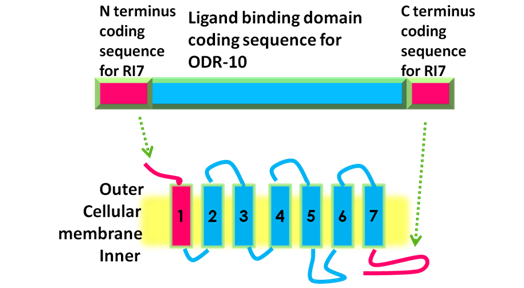Difference between revisions of "Part:BBa K211002"
| Line 4: | Line 4: | ||
[https://parts.igem.org/Part:BBa_K211002 BBa_K211002] encodes a chimeric diacetyl-sensing GPCR which can be functionally expressed in ''S. cerevisiae''. This chimeric receptor is composed of the TM2-TM7 ligand-binding domain of the ''C. elegans'' 7-transmembrane receptor ODR-10, flanked by the N- and C- terminals of the rat OR RI7. It can be localized to the ''S. cerevisiae'' cell membrane and activate the yeast endogenous MAPK pathway upon binding to the ligand diacetyl. | [https://parts.igem.org/Part:BBa_K211002 BBa_K211002] encodes a chimeric diacetyl-sensing GPCR which can be functionally expressed in ''S. cerevisiae''. This chimeric receptor is composed of the TM2-TM7 ligand-binding domain of the ''C. elegans'' 7-transmembrane receptor ODR-10, flanked by the N- and C- terminals of the rat OR RI7. It can be localized to the ''S. cerevisiae'' cell membrane and activate the yeast endogenous MAPK pathway upon binding to the ligand diacetyl. | ||
| − | [[Image:Receptor. | + | [[Image:Receptor.PNG]] |
<!-- Add more about the biology of this part here | <!-- Add more about the biology of this part here | ||
Latest revision as of 17:41, 21 October 2009
RI7-odr10 chimeric GPCR
BBa_K211002 encodes a chimeric diacetyl-sensing GPCR which can be functionally expressed in S. cerevisiae. This chimeric receptor is composed of the TM2-TM7 ligand-binding domain of the C. elegans 7-transmembrane receptor ODR-10, flanked by the N- and C- terminals of the rat OR RI7. It can be localized to the S. cerevisiae cell membrane and activate the yeast endogenous MAPK pathway upon binding to the ligand diacetyl.
Sequence and Features
Assembly Compatibility:
- 10COMPATIBLE WITH RFC[10]
- 12COMPATIBLE WITH RFC[12]
- 21INCOMPATIBLE WITH RFC[21]Illegal XhoI site found at 761
- 23COMPATIBLE WITH RFC[23]
- 25COMPATIBLE WITH RFC[25]
- 1000COMPATIBLE WITH RFC[1000]

